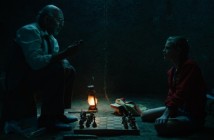
Editor’s Notes: She’s Funny That Way opens in limited theatrical release tomorrow, August 21st.
“Everybody seems to be confused tonight,” a character coyly quips at a mid-point juncture of She’s Funny That Way, and it’s a wonder she doesn’t turn to wink at the audience as she does so. Proudly tossing more balls in the air than it—or, really, we—can ever really hope to juggle, this overdue return to the big screen from film-fanatic-cum-maker Peter Bogdanovich uproariously outlines just how much fun the movies can be. Happily tipping the hat to the heyday of Hollywood, this fresh effort might not meet the timeless heights of its maker’s best like The Last Picture Show and Paper Moon, but its steadfast screwball antics ensure it’s every bit as much an enjoyable ode to the old greats.
Its steadfast screwball antics ensure it’s every bit as much an enjoyable ode to the old greats.

Unashamedly old-fashioned in outlook as much as approach, She’s Funny That Way would seem almost of a piece with Woody Allen efforts like The Purple Rose of Cairo even if it didn’t open with the same Fred Astaire song as that neo-nostalgic classic. But unlike his contemporary, whose insistent adherence to a one-a-year rate has rendered such old gems ever brighter in hindsight, Bogdanovich’s slow recess from the limelight has seemingly afforded him time aplenty for ideas to ferment and old inclinations rise to the surface. As Astaire croons “I’m in heaven”, you get the clear sense Bogdanovich just might be to be back in the director’s chair, such is the contagious joie de cinema with which the movie proceeds to blithely barrel along.
Unashamedly old-fashioned in outlook as much as approach, She’s Funny That Way would seem almost of a piece with Woody Allen efforts like The Purple Rose of Cairo.
And oh, how blithely it barrels: smartly structured as the fond recollections of an ingénue call girl turned Broadway starlet to a sceptical reporter keen to crack the façade, the film has fun not only with a narrative and accompanying cast that’s packed to bursting point, but also with the ideas of storytelling on which the movies are forged. “Never let facts get in the way of a good story,” the interviewee advises, and Bogdanovich has chucked in verisimilitude to boot with a wry sensibility that’s positively decadent in the teetering tower of audacious antics it racks up. The actors can’t but get in on the game, and as the likes of Owen Wilson and Kathryn Hahn, Imogen Poots and Rhys Ifans bounce off each other it’s nigh-on impossible not to get caught up in the fun.
That the film should be populated with so starry a cast is perhaps equal testament to the high regard in which Bogdanovich remains held and the joyous energy of the hijinks he’s cooked up in collaboration with ex-wife Louise Stratten. The extent to which their own interaction is responsible for the script’s breezy even-handedness amidst its characters and their after-hours actions is a matter for the writers to mull, but their team of talent has eyed-up this likeably levelled playing field and run riot on it. From a scene-stealingly brisk Jennifer Aniston at the height of her powers to a blink-and-you’ll-miss-him Michael Shannon at his most efficiently subdued, these bristling players make superbly silly sense of a series of subplots that might have seemed nonsense in hands less firm.
But Bogdanovich is in supreme command here, and there’s nary a moment he’s not skilfully building toward a climax that seems somehow ruthless in its romanticism. We would know well the mark he has made on American cinema even without the three big-name directors who appear in assorted production capacities throughout the closing credits, but it’s nice nonetheless to see them acknowledging influence by allowing it to reach further. That’s in a sense exactly what Bogdanovich is at himself here, and in the last-minute indulgences in old movie clips he seems powerless to resist, we have a terrific three-tiered tip-of-the-hat to the past, and its propagation far into the future.
Bogdanovich is in supreme command here, and there’s nary a moment he’s not skilfully building toward a climax that seems somehow ruthless in its romanticism.



